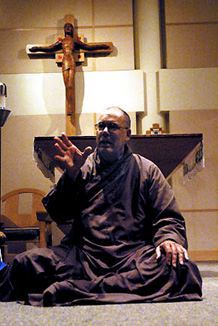|
Common Ground Found in Fasting
Believers in major religions share goals of purification,
self-discipline
By Menaka Fernando - UCLA DAILY BRUIN SENIOR
STAFF
Wednesday - October 20, 2004

photo - THI DAO
- ucla daily bruin
Kusala Bhikshu - Buddhist Chaplain
Speaking at the University
Catholic Center at UCLA
Buddhist
monk Kusala Bhikshu speaks of the importance of a life of self-sacrifice
at the University Catholic Center at UCLA. The concept is crucial
to many religions.
During
the holy month of Ramadan, a little over a billion Muslims around
the world practice their faith by fasting and praying from sunrise
to sunset to show their devotion to God.
Though
the month is exclusive to the Islamic religion, the concepts
of self-discipline and purification that Ramadan embraces are
integrated within the fabric of all major faiths throughout
the globe.
Christianity
has 40 days of sacrifice during the pre-Easter season of Lent.
Judaism has two major days of fast (Yom Kippur and Tisha B'Av)
and five other days throughout the year. Millions of Hindus
throughout the world practice self-control on the eleventh day
of every lunar month, called Ekadashi. And in the Buddhism religion,
practitioners are encouraged to live lives of renunciation and
simplicity.
While
each religion's practice of fasting (which is typically also
associated with community service and abstinence) has very different
historical significances, the widespread practice reflects the
similarity that exists between the teachings behind major faiths.
"It's
a very interesting correlation – religions' uses of fasting,"
said Elliot Dorff, rector and professor of philosophy at the
University of Judaism in Los Angeles. "It's demonstrating
something serious. ... You don't fast in joy; you feast in joy.
When you are fasting, you are marking something that is serious."
In
many faiths, the seriousness of their practice results from
the significance of the event they are commemorating when they
fast.
In
Islam, Ramadan marks God's first revelation to the Prophet Mohommed
through whom God sent guidance to the people, said Muzammil
Siddiqi, the director of the Islamic Society of Orange County.
Like
in Ramadan, the purpose of fasting in the Hindu faith is to
dedicate time (one day out of every month) to God and focus
on doing good works, said first-year undeclared student Anand
Ghandi, who practices the religion, but added that he does not
always observe Ekadashi.
Meanwhile,
Christianity's practice of sacrifice is associated with the
belief that Jesus sacrificed his life on the cross as a symbol
of God's outpouring of love, said George Grose, co-founder of
the Academy of Judaic, Christian and Islamic Studies at UCLA.
In
the same sense, instances in which Jews fast are often associated
with tragedies that occurred to the Jewish people in history,
Dorff said.
While
times of Jewish and Christian fasting indicate periods of mourning,
the mood associated with Ramadan is more celebratory, Siddiqi
said.
"Ramadan
is a very pleasant time; we celebrate our devotion to God. ...
It's a celebration of the Word of God," he said.
Similarly,
the Buddhist faith preaches the achievement of happiness through
fasting and leading a life of simplicity.
"If
Renunciation is your practice, simplicity is the result,"
said Kusala Bhikshu, a monk from the International Buddhist
Meditation Center in Los Angeles. This tradition contrasts from
a life of consumption, he said: "If Consumption is the
practice, then complexity is the result."
To
lead a good Buddhist life, Kusala Bhikshu told a handful of
students gathered at the University Catholic Center on Gayley
Avenue, one should begin by giving up – giving up killing,
lying and stealing to find peace and tranquility in life.
The
differences in individual faiths aside, many believe that self-sacrifice
shows commitment while strengthening individuals of all faiths.
In
Judaism, many fast by not taking in food or drink, not engaging
in sexual intercourse, not taking full showers and ridding themselves
of luxury, Dorff said.
In
many faiths, "people are giving up food and some of the
other necessities and luxuries of life in an attempt to try
to symbolize their commitment to God in some form or the other,"
he added.
Gandhi
agreed that this commitment is beneficial.
"The
concept of sacrifice (and) of giving up everything that you
are attached to, you gain mental control," Gandhi said.
"Your mind grows stronger. ... Everything in our lives
is for physical well-being, but this is for your spiritual well-being."
Several
religious leaders believe that the commonality of fasting is
symptomatic of the connection between different cultures throughout
the world.
Though
there are different reasons behind religious practices, these
similarities show that "even if we think we are different,
we are all connected," Kusala Bhikshu said.
|